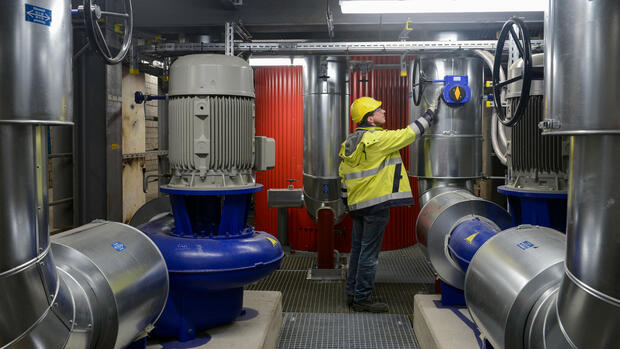Frankfurt, Dusseldorf The supplier Vattenfall is in Berlin in front of a shambles. The Swedish company wanted to sell its district heating company to the highest bidder, with a valuation of more than three billion euros in the room.
With the help of the investment bank Citi, Vattenfall organized a sales process for the subsidiary Stadtwärme. But demand was muted. According to financial sources, none of the well-known interested parties from the circle of infrastructure investors – such as Macquarie, Brookfield or CPPIB – submitted a binding offer by the deadline, which expired a few days ago.
The reason is infrastructure investors’ fear of being booted out by the Berlin state government, according to several people familiar with the matter. Most recently, the Berlin CDU parliamentary group leader Dirk Stettner said in an interview with the “Tagesspiegel” that he thinks expropriations against compensation in the energy sector are conceivable.
It is important for the state of Berlin to acquire the district heating infrastructure in its own city. Berliners should heat more climate-friendly in the future. This is possible with heat pumps – but also with district heating. Here, for example, heat is conducted from large power plants through pipes to households.
This is only environmentally friendly if the heat is generated without fossil fuels. Berlin’s Senator for Economic Affairs, Franziska Giffey, said on Monday when she presented her administration’s new mission statement for the years up to 2026: “We have to become climate-neutral in district heating.”
State of Berlin is also interested in gas pipelines
While the state of Berlin seems to be getting closer to its goals in purchasing district heating, companies are increasingly moving away from the idea of participating in a purchase. Eon and Engie originally formed a bidding consortium with the city for the Stadtwärme, but had recently dropped out, according to several people familiar with the matter.
Vattenfall said a decision on the sale of the heating business is expected later this year. The company did not provide any further details. The Berlin Senate Department for Finance, which is in charge of the negotiations, declined to comment. Economics Senator Franziska Giffey said on Monday that the state was taking part in the Stadtwärme bidding process.
The new Berlin government made up of CDU and SPD had already stated in their coalition agreement that they wanted to buy Berlin’s district heating – and also want to take over a majority in the Berlin gas supplier Gasag. Gas pipelines also play an important role in the organization of the energy and heat transition.
>> Also read: Heating Act: These are the crucial aspects
The state of Berlin could eventually merge the district heating and gas business, according to people familiar with the matter. In this way, the country would gain control of both infrastructures.
The State of Berlin is likely to take over the Gasag shares also buy from the utility Vattenfall, which owns the company together with the German grid operator Eon and the French energy group Engie. Berlin would secure the majority by contributing Stadtwärme to Gasag, but would still have Eon and Engie on board as operational partners with knowledge of the industry.
Vattenfall has so far tried to keep the two deals separate and explicitly launched only one sales process for Stadtwärme, emphasizing that there is no preferred buyer. Apparently, this did not convince private investors.
The former red-green-red state government in Berlin had already agreed in 2016 to examine the remunicipalisation of the city heat. After the change of government to black and red this year, the coalition agreement states that both Stadtwärme and a majority stake in Gasag are to be acquired in order to create an integrated network operation for gas and heat. Berlin had already bought back the power grid from Vattenfall in 2021 for 2.14 billion euros.
Expensive decarbonization of heat supply
The city of Berlin had originally planned to bring external investors on board to take over Stadtwärme. That is no longer part of the considerations at this time, according to people familiar with the matter.
The costs of buying the shares and investing in the decarbonization of the energy supply are likely to be high. Berlin wants to become climate-neutral by 2045 and phase out coal by 2030. In September 2021, the city’s environmental senate presented the plans for the future heat supply of the capital in a strategy study. At present, more than half of the heat comes from coal-fired power plants, which according to previous plans should be replaced primarily by new gas-fired power plants.
Despite the consequences of the Ukraine war, gas will be needed as a transitional energy source in the coming years, say experts. The planned conversion to gas, but also geothermal energy, industrial waste heat, biogas, hydrogen and heat generation using electricity from renewable sources is likely to cost two to four billion euros.
On Monday, Vattenfall announced that by 2030 district heating would be generated from 40 percent renewable energies and by 2040 all heat would be virtually climate-neutral. It was not specified how high the costs would be. According to company circles, the high investments are too much for Vattenfall, which is why the group started the sales process.
More: District heating often makes heat pumps superfluous.
